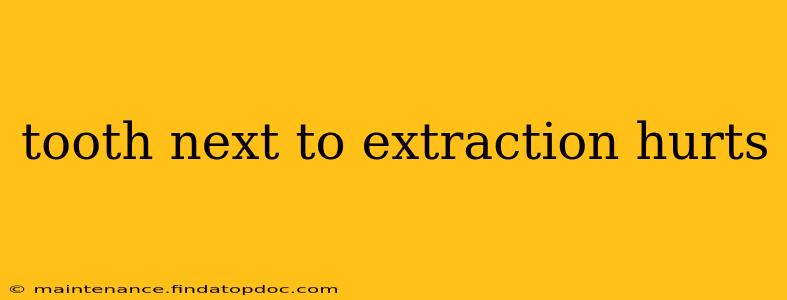Having a tooth extracted can be a somewhat uncomfortable experience, and it's perfectly normal to experience some pain and discomfort afterward. However, if the tooth next to the extraction site is hurting, it warrants attention. This pain could stem from several factors, and understanding the potential causes is crucial for appropriate management. This article will explore the reasons why the adjacent tooth might hurt after an extraction and what you can do about it.
Why Does the Tooth Next to My Extraction Hurt?
Several reasons can explain why the tooth adjacent to your extraction site is painful. It's not always directly related to the extraction itself. Let's explore some common causes:
1. Referred Pain:
This is a common culprit. Nerve pathways in your jaw are complex. Pain originating from one area, like the extraction site, can be felt in a seemingly unrelated area, such as the neighboring tooth. The inflammation and trauma from the extraction can trigger referred pain in the adjacent tooth. This pain often feels dull and achy rather than sharp.
2. Underlying Tooth Issues:
The extraction might have revealed a pre-existing problem in the adjacent tooth. Perhaps a cavity, crack, or infection was masked before, now becoming noticeable due to the extraction. The procedure may have also inadvertently caused minor trauma to the neighboring tooth's supporting structures.
3. Dry Socket:
While not directly affecting the adjacent tooth, a dry socket (alveolar osteitis) in the extraction site can cause intense, radiating pain that might feel like it's coming from the neighboring tooth. A dry socket is a painful complication where the blood clot protecting the extraction site dislodges, exposing the bone.
4. Sinus Issues:
Upper molar extractions can sometimes cause problems with the maxillary sinus. If the extraction site is close to the sinus, pain might be felt in the adjacent tooth or even referred to the sinus itself. This is especially relevant for upper back teeth extractions.
5. Infection:
An infection at the extraction site can spread, causing pain in adjacent teeth and surrounding tissues. Signs of infection include swelling, increased pain, redness, and possibly pus or a foul odor.
What Should I Do If the Tooth Next to My Extraction Hurts?
If the adjacent tooth pain is significant or persistent, contact your dentist or oral surgeon immediately. They can properly diagnose the cause and recommend the best course of action. Do not attempt to self-treat.
How Long Should I Expect Pain After a Tooth Extraction?
Pain after a tooth extraction is normal but should gradually decrease over time. Most discomfort subsides within a week, but some mild soreness may persist for a few more days. However, any new or worsening pain in the adjacent tooth requires professional assessment.
Can I Take Over-the-Counter Pain Relievers?
Over-the-counter pain relievers like ibuprofen (Advil, Motrin) or acetaminophen (Tylenol) can help manage post-extraction pain. However, always follow the dosage instructions and consult your dentist if you have concerns or if the pain doesn't improve.
Is It Normal for the Adjacent Tooth to Be Sensitive After an Extraction?
Some mild sensitivity in the adjacent tooth is possible after an extraction, particularly if it was very close to the extracted tooth. This is often due to temporary irritation or inflammation. However, significant or persistent pain is not normal and should be checked by a dental professional.
This information is for general knowledge and should not be considered medical advice. Always consult a qualified dentist or oral surgeon for any dental concerns.
